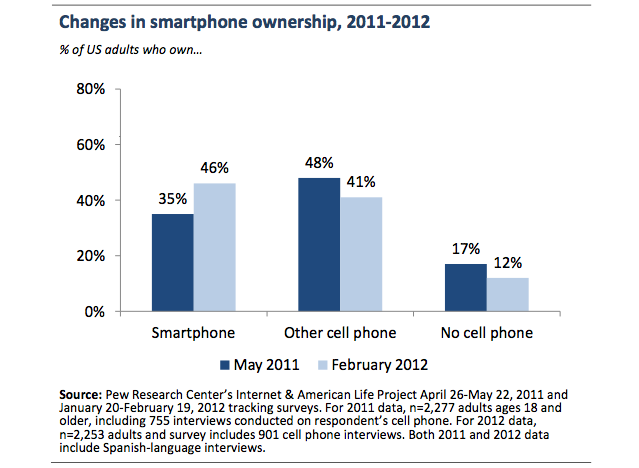Smartphone use is surging in the United States, powered by the massive success of Apple’s iPhone and Google’s Android operating system. In fact, for the first time, smartphones now outnumber more basic mobile phones, according to a new Pew survey. The growing ubiquity of these sophisticated mobile device is fueling an entirely new industry — the so-called “app economy” — but it’s also placing increased burdens on the mobile networks operated by the likes of AT&T and Verizon Wireless.
Almost half — 46% — of all American adults now own a smartphone, mobile devices that allow users to check email, browse the web and use hundreds of thousands of applications available through Apple’s App Store and Google’s Android Market. That’s an 11% increase from the 35% of Americans who said they owned a smartphone in May of 2011. By contrast, 42% of Americans say they own a more basic cell-phone, also known as a “feature phone.”
“Nearly every major demographic group—men and women, younger and middle-aged adults, urban and rural residents, the wealthy and the less well-off—experienced a notable uptick in smartphone penetration over the last year,” Pew said in a statement accompanying the survey. “Overall adoption levels are at 60% or more within several cohorts, such as college graduates, 18-35 year olds and those with an annual household income of $75,000 or more.”
IPhones and Google Android devices are leading the smartphone surge:
- 20% of mobile phone users say they own an Android device, up from 15% in May 2011.
- 19% own an iPhone, up from 10% in May 2011.
- 6% own a Blackberry, down from 10% in May 2011.
- 2% own a Windows device; 1% own a Palm device; both unchanged since May 2011.
Smartphone usage growth is fueling the rise of the so-called “app economy” — with one economist recently estimating that 446,000 jobs have been created in fields that build and market mobile applications. Apple’s App Store now boasts over 500,000 applications, and the company is nearing a staggering 25 billion individual application downloads. For its part, Google’s Android Market has over 450,000 apps available, and has seen over 10 billion downloads.


